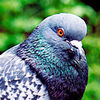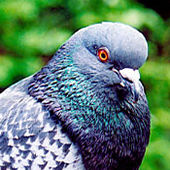Some people call them "flying rats". In many people they provoke intensely negative sentiments, which sends many other people, like me, rushing to their defence. I've discovered some fascinating information on pigeons, which can be found via the links on page two. I realised I was quite ignorant of their habits and their history. Ignorance is never a good thing - and generally people who say they "hate pigeons" are just demonstrating ignorance.
Pigeons tend to be dependent on the goodwill of humans. Which is possibly not the strongest position for a bird to be in when many of the population views you as a flying rat.
Pigeon problems - in gardens and towns
Certainly you can feel your goodwill diminishing if it seems your garden is being overrun with pigeons. If you feed garden birds you often end up also feeding town pigeons. I try to feed as many birds as possible, and wouldn't mind a couple of pigeons, as they are often rather handsome birds, like "Hooky", pictured. Large groups of them visiting can become a problem.
Unlike the other ground-feeders, like blackbirds and dunnocks, pigeons seem entirely dependent on humans. Blackbirds, for example, will be pleased if you give them some food, but if you don't, they'll go off and look for earthworms under the mulch, or eat the apples that have fallen from the tree. Pigeons don't like earthworms or apples. Pigeons learn to hang around under the feeders waiting for the seeds and nuts dropped by the sparrows, tits and finches. Or they wait for other cereal-based food like bread (or in town centres, pies, pasties, and burgers from MacDonalds).
Many local councils now have official guidelines on pigeons, which discourage local people from feeding them. The emphasis on discouraging feeding is well-meant. The more pigeons are fed, the more they are likely to reproduce, so the more pigeons there are. The more pigeons there are the more the bird is seen as a pest.
Knowing all this, I am faced with a dilemma. The guidelines make sense, and I try not to feed the pigeons. But the council policy chiefs aren't sitting here looking out of my window having to endure the rather heart-rending sight of pigeons in the middle of winter scrabbling about in the foul weather for tiny bits of seed. As far as I'm aware neither have they given any useful guidelines on how to feed other garden birds without also feeding the pigeons.
It could be said that pigeons do a great job of clearing up food scraps that would otherwise attract rats and mice. They are, in their own way, doing a public service for a very messy species (us).
Pigeons and disease
The other oft-quoted thing about pigeons is that "they carry disease". (Like we don't?) Pest control companies have websites listing so many pigeon diseases that you wonder how any manage to survive. They then helpfully tell you of the various poisons they can administer to the pigeons. They don't tend to do the poisoning in a public and open kind of way, as it upsets people to see the birds dying, as of course it would. We prefer things to be dealt with for us without having to see any mess.
Town pigeons are perhaps more susceptible to disease because they live in cramped urban conditions, and feed on the remains of the fast food we drop in the street. Remains of burgers, pizzas and chips is not their natural or preferred diet.
I had to confront the problem of pigeon diseases after a sickly pigeon visited my garden. This poor creature is now at the big pigeon loft in the sky, after being put down at the local vets. At the vets this bird was treated with respect, just as any other creature would be. Quite right too.
Who's the real bird-brain?
Pigeons live in towns in the first place in such great numbers because we are too messy and useless to clear up after ourselves properly, and we need help. Pigeons see all that excess food lying about and of course they eat it. Pigeons, even the feral ones, are doing us a favour, by tidying up all the crap we leave behind. Maybe instead of moaning about pigeons we should be encouraging people not to treat town centre pavements like one big refuse bin, and to use their allegedly superior brains to help them find one of those receptacles that says "Litter" on the front.
Human kindness, and pigeon prowess
Then people deliberately feed them. It seems that there are two reasons people feed pigeons in town centres: first, when you're surrounded by buildings and shopfronts and queues of traffic it's always rather nice to see a bird, particularly a friendly bird like the pigeon. Second, if you have any heart at all, you can't help but be touched by these often scraggy-looking birds eating manky trodden-in sandwiches off a dirty pavement, near a line of stinking car exhausts.
In the past we have used them and their flying abilities and their intelligence. All the animals we think are clever we use when it suits us. Later, in our urge to control everything to make our own lives as easy as possible, we want rid of the creatures that we find inconvenient.


